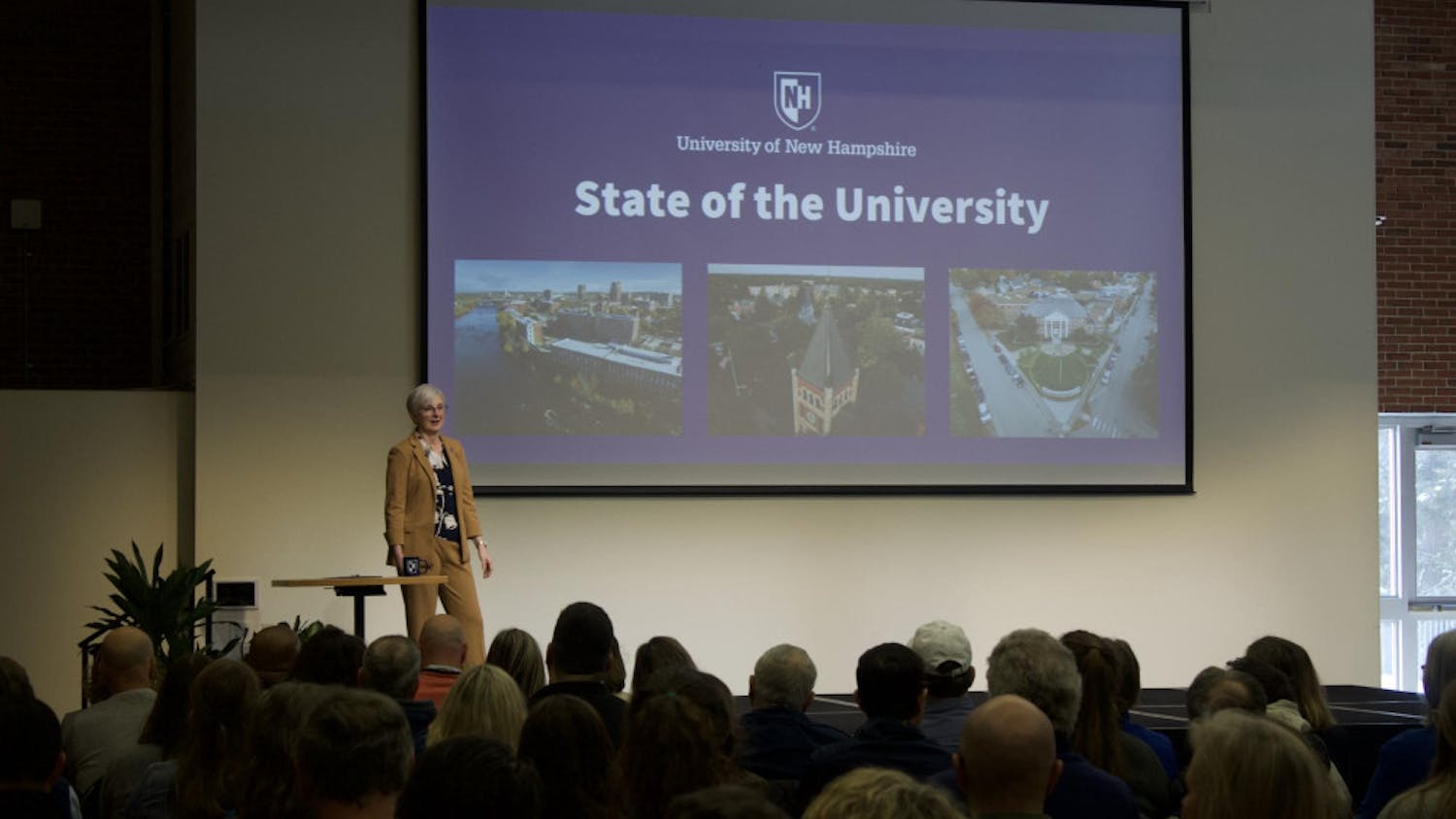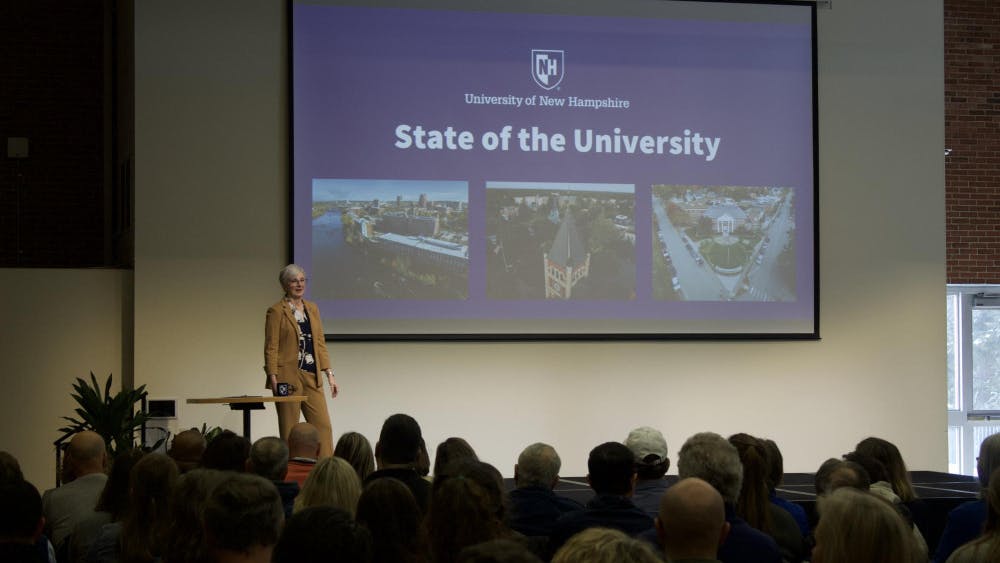Forest Park, a graduate student apartment complex which is also the University of New Hampshire’s (UNH) only on-campus family housing option, is scheduled to be closed for demolition by June 30, 2019.
The decision to demolish the 16-building apartment complex came after a state fire marshal’s review of a February report on the buildings, as well as a detailed assessment of the apartments in June. It was later determined in June that four of the buildings should be vacated for the 2018-19 academic year, and the others should repair damaged walkways (which are still in progress) in order to keep them suitable for living until demolition.
“Like a lot of buildings around campus, at a certain point in time, buildings come to the end of their useful life,” Associate Vice President of Business Affairs David May said. “Conditions started to deteriorate…we had to determine which buildings we could keep open for another year.”
May said because of the current state of the Forest Park residences, which were constructed in 1960, it makes more financial sense to demolish the buildings and rebuild rather than to repair them, which would have required the replacement of major infrastructure systems. Other Forest Park buildings were demolished for similar reasons in 2009, and have since been replaced by the SERCs, which are undergraduate suites. The university has had the desire to replace Forest Park with more suitable graduate student housing since 2012, according to the Campus Master Plan.

Fatemeh Rahmanifard, a physics Ph.D. candidate from Iran who has lived at Forest Park with her husband, Hamid Azhdehfar, for four years, says she has had maintenance problems in her apartment over the years, like air getting in through closed windows and having no hot water for days at a time during winter holidays.
According to May, 105 people currently reside at Forest Park, including 54 single graduate students, 17 married couples, and six families. Many of the graduate students living at Forest Park are international students.
May said residents were notified of Forest Park’s closure on Aug. 2.
“One obvious effect is there will be no family housing options on campus. The other related thing is, it limits graduate student housing on campus. It limits international student housing options on campus. And this is at a time when the grad school and the university as a whole is ramping up recruitment of international and graduate students, especially in master’s programs and professional credential programs,” Jacob Bennett, external relations officer of the Graduate Student Senate (GSS), said. The GSS has been in communications with housing since they found out about Forest Park’s demolition.
“You as a graduate student already don’t know when you want to graduate, you have problems with your job, and you’re dealing with a lot of uncertainties, especially when you’re an international student…one thing we felt safe about was our apartments being here and being on campus, close to our office without having to worry about huge increases in the rent…all of that is gone now,” Rahmanifard said.

Bennett said GSS found out about the project “through the grapevine” from Forest Park tenants and GSS members. GSS was present at an Aug. 7 open forum with Forest Park residents, but was not officially notified until Aug. 20, when housing sent a notification to the graduate school, in violation of the body’s constitution signed by the President in 2011 stating that GSS must be notified of any changes to graduate student housing. They were similarly not given notification of the $17,600 fee proposed upon Forest Park families sending children to Oyster River public schools last year, which was later retracted after a report published by The New Hampshire.
“I want to make sure that low bar notification isn’t missed again,” Bennett said.
May said that GSS was not notified because the university thought it was important to notify Forest Park residents first.
Another major concern of GSS is Forest Park’s website, which is still up and running with information for potential future tenants. However, UNH Housing's application site for graduate student housing does state that Forest Park is no longer taking applications.
“Right now, the website is still up for Forest Park, and the information is still reflecting that it is a family housing option,” Bennett said.
May said the Forest Park website is still live to provide communications with the current residents, and the university is “reviewing pages that could be taken down as a result of the closure.”
The four now-vacated buildings (buildings 17, 21, 31 and 32) housed 19 residents who had to move out of their apartments and into other existing Forest Park apartments at an Aug. 7 open forum for Forest Park residents. Two of those residents ended up leaving Forest Park, while 17 stayed.
Bence Cserna, a computer science Ph.D. candidate and member of the Tenant’s Committee, was one of the residents who had to move to an apartment this summer.
“The biggest thing that bothers me is the way they handled the closure of the buildings. They basically knew that things were not going to work out since February…they did not tell us or the GSS. And people are still hoping that they will get in,” Cserna, who has been living at Forest Park for over two years, said.
“Definitely everybody was shocked. There wasn’t enough transparency here. We all felt that way. We all felt they we are suffering from some form of miscommunication and we lacked transparency here,” Rahmanifard said.
Cserna also said he and other residents did not receive a copy of a new lease after its automatic renewal on June 30, and did not have a new lease until August. When he received a new lease, some provisions had changed and rent had increased by 2.8 percent for this year due to increases in operating costs. Residents had been informed of the rent increase in April.

The University plans to hire a consultant who will begin a strategic planning process of UNH’s needs for graduate and family housing starting in October with a report expected to be completed by March of 2019. There will be a Steering Committee with two graduates (one from the Forest Park Tenant’s Committee) and two undergraduate students along with other University staff, which will help evaluate the recommendations of the consultant. Until then, housing will be trying to assist Forest Park residents in finding other living options.
“We’re going to encourage [graduate students] as an option to consider Babcock. We’re going to reach out to the local community, and we’re willing to write reference letters for our tenants…so we’re willing to help that way. We're having conversations with local developers and landlords to encourage them to help with the situation,” May said. Forest Park residents can also choose to end their lease at any time if they find alternative housing during this year.
“Going forward, we’re going to do our best to have a cost-effective place in the next two or three years,” May said, “This is giving us the opportunity to step back and work with students. In the end my hope is that we will be offering much better services to our students.”
Michael Saputo, assistant director of apartments and summer conferences who oversees Forest Park, was contacted but was not able to comment on this story.
Jordyn Haime can be contacted at jlh1036@wildcats.unh.edu, or on Twitter at @JordynHaime.











